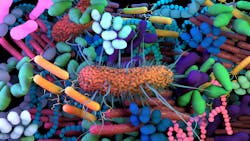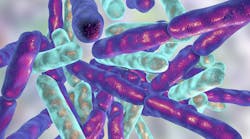Probiotics vs. antibiotics for post-dental surgery
When managing infections after dental surgery, antibiotics are traditionally the go-to treatment. However, probiotics—beneficial microorganisms—are emerging as an alternative or complementary option with distinct advantages. This article compares these two approaches in an effort to provide dental health professionals with a clear understanding of their mechanisms, benefits, and effects.
Understanding probiotics and antibiotics
Probiotics: Probiotics are live microorganisms that offer benefits to the host by promoting a balanced microbial environment. These “health-friendly bacteria” naturally exist in the body and can be supplemented through dietary products or specialized supplements. Their primary action mechanisms include the following:
- Adhesion and antagonism: Adhering to oral surfaces, probiotics produce antimicrobial compounds that inhibit pathogenic bacteria.
- Immunomodulation: By stimulating the host’s immune response (e.g., NK cell activation and IgA antibody production), probiotics enhance immunity.
- Competitive exclusion: Probiotics compete against harmful microorganisms, limiting their growth and colonization.
Antibiotics: Antibiotics are pharmaceutical substances designed to target and kill or inhibit bacteria responsible for infections. They are a hallmark of modern medicine for managing bacterial infections. However, they also carry several adverse effects:
- Broad-spectrum killing: Antibiotics eliminate harmful pathogens but often harm beneficial gut and oral microbiota, leading to dysbiosis.
- Antibiotic resistance: Overuse or improper use of antibiotics fosters resistance, making infections more difficult to treat.
- Systemic side effects: Antibiotics can contribute to inflammation, diarrhea, and long-term issues such as obesity, food allergies, and asthma.
Both probiotics and antibiotics play important roles in managing postoperative infections, yet their mechanisms and long-term effects differ significantly.
Key differences in treating post-dental surgery infections
Microbial impact1:
- Probiotics positively influence the microbiome by supporting a healthy balance of bacteria.
- Antibiotics, while effective at eradicating infection-causing bacteria, often disrupt the microbiota, affecting both harmful and beneficial organisms.
Side effects:
- Probiotics have minimal side effects and often provide additional general health benefits, such as reducing inflammation and improving gut health.
- Antibiotics, on the other hand, can cause side effects such as gastrointestinal issues and antibiotic resistance, as well as allergic reactions.
Preventive vs. curative role:
- Probiotics focus on prevention by enhancing the microbiota’s resilience and immune response. They may prevent postsurgical infections while improving oral and overall health.
- Antibiotics typically serve a curative role, addressing established infections but with a potential cost to the broader microbiota.
Immune modulation:
- Probiotics stimulate various immune pathways, contributing to long-term microbial stability and oral health.
- Antibiotics disrupt the immune balance by destroying microbial populations indiscriminately, potentially impairing immunity.
Benefits of probiotics and antibiotics in dental surgery
Probiotics2: Probiotics have been demonstrated to improve periodontal outcomes through the following actions:
- Reducing plaque and gingival inflammation, both critical factors in periodontal health
- Improving clinical outcomes in peri-implantitis cases
- Excluding pathogenic bacteria that cause halitosis and other oral infections
Probiotics are especially effective because they require interactions with the oral epithelium and microbial ecosystem, resulting in antimicrobial compound production and competitive exclusion of harmful species.
Antibiotics: Antibiotics remain an effective short-term solution for managing bacterial infections due to their ability to directly target pathogenic strains. They are primarily reserved for severe bacterial infections in postsurgical cases, where immediate mitigation is necessary.
However, the systemic side effects of antibiotics, such as the potential development of dysbiosis and resistance, require careful consideration when selecting them as the sole treatment.
Both studies corroborate the potential use of probiotics as a safe and effective alternative or adjunct to traditional antibiotic therapies.
Practical considerations in clinical decision-making
When deciding between probiotics and antibiotics—or when combining both approaches—for post-dental surgery infections, consider the following factors3:
- Severity of infection: Antibiotics are more appropriate for severe bacterial infections that require immediate intervention, while probiotics can be implemented as a preventive or adjunctive measure in milder cases.
- Patient history: Patients with a history of antibiotic resistance or adverse reactions to antibiotics may benefit more from probiotics.
- Long-term impact: Probiotics align with long-term health goals by improving microbial balance, reducing systemic inflammation, and minimizing resistance issues.
- Adjunctive use: Pairing probiotics with antibiotics may help mitigate antibiotics’ side effects, such as dysbiosis, ensuring better recovery and microbial stability posttreatment.
Summary
Both probiotics and antibiotics have legitimate roles in managing post-dental surgery infections.4 Antibiotics deliver quick, effective results for acute cases, while probiotics offer preventive and adjunctive benefits with minimal side effects. Combining these treatments where appropriate can provide the best of both worlds, facilitating recovery while prioritizing long-term oral and systemic health.5 By considering the nature of the infection, patient history, and treatment goals, health professionals can make informed decisions about these therapies.
Editor’s note: This article originally appeared in Perio-Implant Advisory, a chairside resource for dentists and hygienists that focuses on periodontal- and implant-related issues. Read more articles and subscribe to the newsletter.
References
- Jørgensen MR, Abrahamsson P, Wälivaara DÅ, Twetman S. Probiotic supplements and postoperative complications after tooth extractions and third molar surgery: a systematic review. Minerva Dent Oral Sci. 2022;71(4):242-247. doi:10.23736/S2724-6329.22.04661-7
- Zhang Y, Ding Y, Guo Q. Probiotic species in the management of periodontal diseases: an overview. Front Cell Infect Microbiol.2022;12:806463. doi:10.3389/fcimb.2022.806463
- Shirbhate U, Bajaj P, Chandak M, et al. Clinical implications of probiotics in oral and periodontal health: a comprehensive review. 2023;15(12):e51177. doi:10.7759/cureus.51177
- Chopra R, Mathur S. Probiotics in dentistry: a boon or sham. Dent Res J (Isfahan). 2013;10(3):302-306. Retraction in: Dent Res J (Isfahan). 2014;11(3):308.
- Puzhankara L, Banerjee A, Chopra A, Venkitachalam R, Kedlaya MN. Effectiveness of probiotics compared to antibiotics to treat periodontal disease: systematic review. Oral Dis. 2024;30(5):2820-2837. doi:10.1111/odi.14781
About the Author

Scott Froum, DDS
Editorial Director
Scott Froum, DDS, a graduate of the State University of New York, Stony Brook School of Dental Medicine, is a periodontist in private practice at 1110 2nd Avenue, Suite 305, New York City, New York. He is the editorial director of Perio-Implant Advisory and serves on the editorial advisory board of Dental Economics. Dr. Froum, a diplomate of both the American Academy of Periodontology and the American Academy of Osseointegration, is in the fellowship program at the American Academy of Anti-aging Medicine, and is a volunteer professor in the postgraduate periodontal program at SUNY Stony Brook School of Dental Medicine. He is a trained naturopath and is the scientific director of Meraki Integrative Functional Wellness Center. Contact him through his website at drscottfroum.com or (212) 751-8530.

